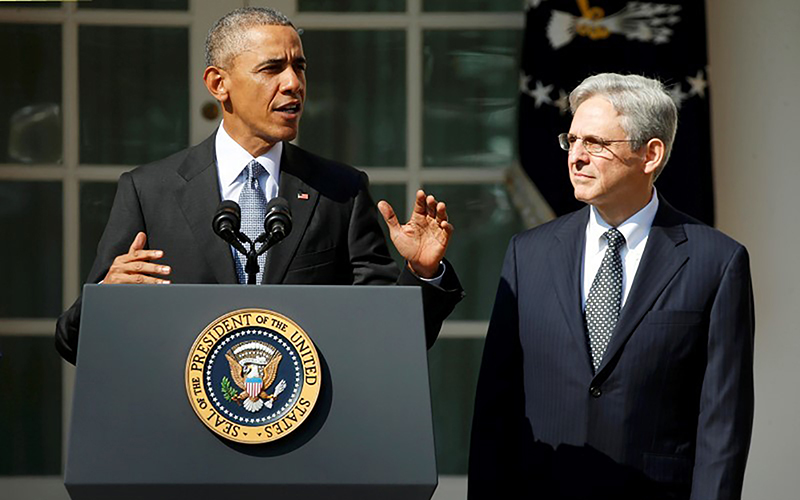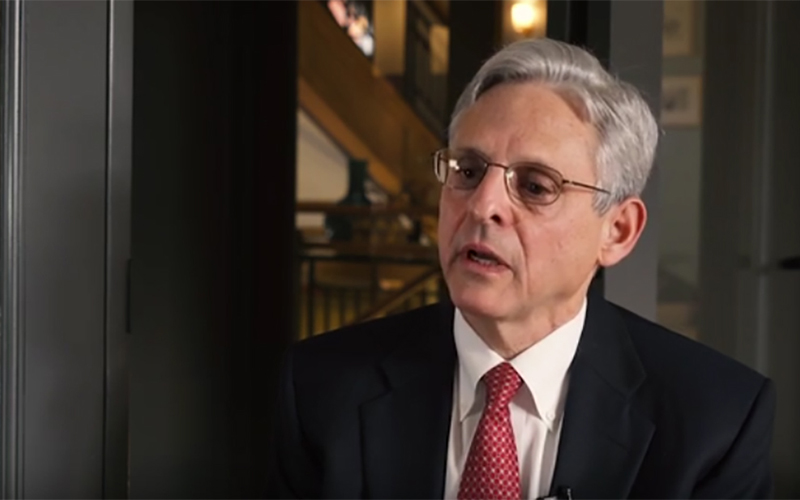
President Barack Obama with his Supreme Court nominee, Chief Judge Merrick Garland of the U.S. Court of Appeals for the District of Columbia. Senate Republicans have said the nomination of a replacement for the late Supreme Court Justice Antonin Scalia. (Photo by Kevin Lamarque/Reuters)

Merrick Garland, the chief judge of the U.S. Circuit Court of Appeals for the District of Columbia, was tapped Tuesday by President Barack Obama to fill the Supreme Court seat left vacant by the February death of Justice Antonin Scalia. (Photo courtesy whitehouse.gov)
WASHINGTON – Arizona’s senators fell in line with other Republicans who said Wednesday that there should be no vote on President Barack Obama’s nominee to fill the Supreme Court vacancy until the next president is elected.
Obama introduced U.S. Circuit Judge Merrick Garland as his pick to succeed the late Justice Antonin Scalia on Wednesday, saying the nomination fulfilled his constitutional duty as president and “now it’s time for the Senate to do theirs.”
But Senate Republicans have said since shortly after Scalia’s February death that they would not consider an Obama nominee but would “give the people a voice in the filling of this vacancy,” in the words of Senate Majority Leader Mitch McConnell, by waiting for them to elect the next president.
“I do think Republicans have a defensible position not to consider a nominee,” said Sen. Jeff Flake, R-Arizona, after Garland’s nomination was announced in a Rose Garden press conference.
Flake said he had talked to the president Wednesday and that he has always said he would meet with Garland. But he agrees that this is not the time to vote, even though he recognized the possible risk in delaying action.
“If it comes to a lame duck and we’ve lost the election and my choice is between Garland and a likely more liberal nominee by President Clinton,” he said, referring to current Democratic presidential front-runner Hiller Clinton, “I’d choose Garland.”
That line of reasoning was called “ridiculous” by Arizona State University law professor Paul Bender.
“If he (Garland) is qualified now, why not appoint him?” Bender asked.
Obama said the “exhaustive process” of reviewing Supreme Court candidates led him to Garland, who he said is “not only one of America’s sharpest legal minds” but someone who has “earned the respect and admiration of leaders from both sides of the aisle.”
Garland started working for the government as a federal prosecutor in 1989, during the first Bush administration. He rose through the Department of Justice, working first as deputy assistant attorney general for the criminal division and later as principal associate deputy attorney general. While at Justice, he was involved in the prosecution of several major cases including the Oklahoma City bombing, the Unabomber and the Montana Freemen.
Garland was nominated in 1997 to a judgeship on the U.S. Circuit Court for the District of Columbia, where he has remained for 19 years and currently sits as chief judge.
Sen. John McCain, R-Arizona, voted for Garland’s 1997 nomination to the circuit court. But he said Wednesday that the decision now is not about Garland’s qualifications but “whether the American people will have a voice” through this fall’s elections.
“With less than a year left in a lame-duck presidency and the long-term ideological balance of the Supreme Court at stake, I believe the American people must have a voice in the direction of the Supreme Court by electing a new president,” McCain said in a statement from his office.
McCain and other Republicans alluded to Vice President Joe Biden’s call in 1992, when he was still a Democratic senator from Delaware, against Supreme Court nominations until after that year’s presidential elections, should a justice retire that year.
“I’m with Joe Biden,” McCain said as he walked off the Senate floor Wednesday.
But Bender called those accounts of Biden’s statements “annoying,” saying “that’s not what Biden said.”
“Biden said no one should retire from the court deliberately in the last year of that president’s term to give them another appointment,” Bender said.
He said arguments that Obama should not be making a nomination during an election cycle are “just wrong” and that the president “is just as much the president now as he was in his first term.”
“Of course it’s about the person,” Bender said of Garland’s nomination. Senators are “supposed to consent to that if it’s a qualified person being nominated.”
That echoed a point by Obama, who said he hoped senators would reflect on the importance of the appointment during the two-week Easter recess that begins this weekend.
“Presidents do not stop working in the final year of their term. Neither should a senator,” Obama said.